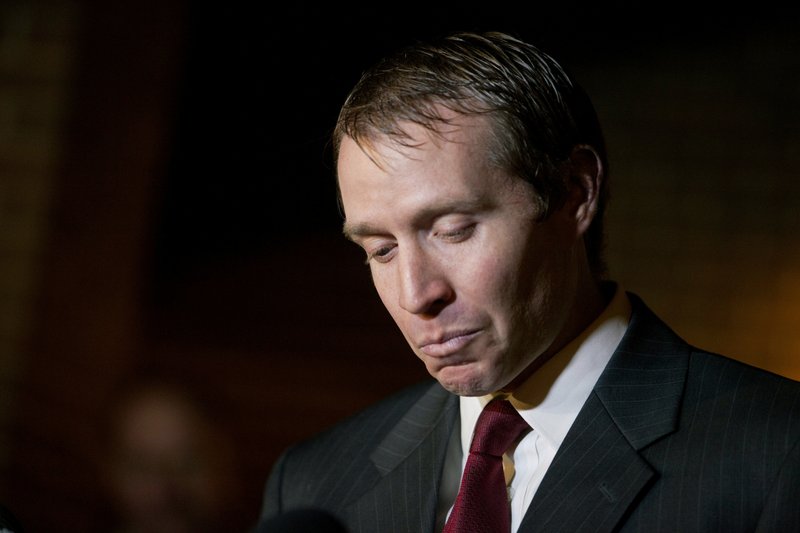HARTFORD, Conn. -- The father of a victim of the Sandy Hook Elementary School shooting has won a defamation lawsuit against the authors of a book that claimed the shooting never happened -- the latest victory for victims' relatives who have been taking a more aggressive stance against conspiracy theorists.
The book, Nobody Died at Sandy Hook, has been pulled from shelves to settle claims against its publisher filed by Lenny Pozner, whose 6-year-old son, Noah, was killed in the shooting.
"My face-to-face interactions with Mr. Pozner have led me to believe that Mr. Pozner is telling the truth about the death of his son," Dave Gahary, the principal officer at publisher Moon Rock Books, said Monday. "I extend my most heartfelt and sincere apology to the Pozner family."
A Wisconsin judge issued a summary judgment Monday against authors James Fetzer and Mike Palacek, a ruling that was separate from the settlement between Pozner and the book's publisher. A trial to decide damages has been set for October.
Pozner has been pushing back for years against hoaxers who have harassed him, subjected him to death threats, and claimed that he was an actor and his son never existed. He has spent years getting Facebook and others to remove conspiracy videos and set up a website to debunk conspiracy theories.
Lately, the fight has been joined by others who lost relatives in the Dec. 14, 2012, school shooting in Newtown, Conn. After quietly enduring harassment for years, some have changed their approach, deciding the only way to stop it is to confront it. Their efforts have turned the tables on the hoaxers, including Alex Jones, host of the conspiracy-driven Infowars website.
Victims' families scored another victory Tuesday when a Connecticut judge imposed sanctions on Jones for an outburst on his Web show against one of the families' lawyers.
In the case against Jones, the families of eight victims and a first responder say they've been subjected to harassment and death threats from his followers. The judge ruled in the defamation case that Jones must undergo a sworn deposition, which is scheduled for July in Texas.
Judge Barbara Bellis on Tuesday ordered the Infowars host to pay some of the relatives' legal fees and prohibited him from filing motions to dismiss their defamation lawsuit against him.
The families of several of the 20 children and six educators killed in the 2012 shooting are suing Jones, Infowars and others for promoting the hoax theory.
Jones made angry comments on his show Friday about a lawyer for the families, accusing him of trying to frame him by planting child pornography in documents Jones' attorneys submitted to the families' lawyers.
On Monday, lawyers for the families disclosed that child pornography was found in electronic files sent to them by Jones as part of the discovery process. An attorney for Jones said the pornography was in emails sent to his client that were never opened.
Robbie Parker, whose 6-year-old daughter Emilie was among 20 first-graders and six educators killed at Sandy Hook, spent years ignoring people who called him a crisis actor. His family moved to the West Coast, but still the harassment didn't stop. He would get letters from people who found his address. He was once stopped in a parking garage by a man who berated him and said the shooting never happened.
"You are taught when you are young that you ignore bullies and eventually they will leave you alone," Parker said. "But as time went on, and my other girls were getting older, I realized they weren't stopping, and some of this was getting worse and getting more personal."
Parker is now part of a lawsuit against Jones, has testified before Congress and pushed for changes on social media platforms, such as YouTube, which announced this month that it will prohibit videos that deny the Sandy Hook shooting and other "well-documented events."
Pozner is the lead plaintiff in several of at least nine cases filed against Sandy Hook deniers in federal and state courts in Connecticut, Florida, Texas and Wisconsin.
Wisconsin's Dane County Circuit Judge Frank Remington ruled Monday that Pozner had been defamed by Fetzer and Palacek, whose book claimed, among other things, that Noah's death certificate had been faked, according to Pozner's lawyer, Jake Zimmerman.
"If Mr. Fetzer wants to believe that Sandy Hook never happened and that we are all crisis actors, even that my son never existed, he has the right to be wrong. But he doesn't have the right to broadcast those beliefs if they defame me or harass me," Pozner said. "He doesn't have the right to use my baby's image or our name as a marketing ploy to raise donations or sell his products. He doesn't have the right to convince others to hunt my family."
A Section on 06/19/2019
